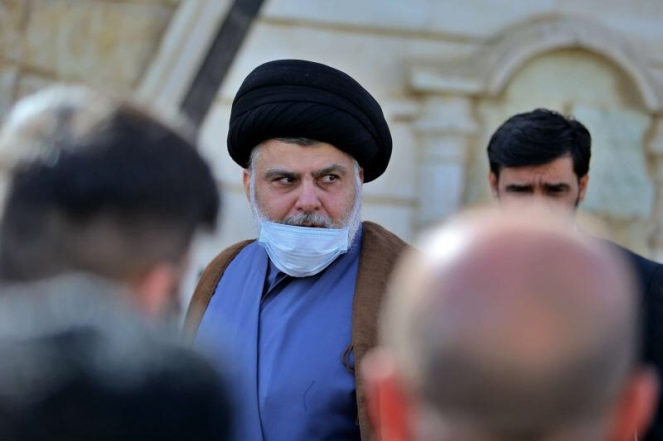
Sadr offers his own militias’ help to disarm other militias in Iraq
BAGHDAD–Iraqi Shia cleric Moqtada Sadr is increasingly wanting to appear as a statesman while his political ambitions to hold the reins of the executive authority in the country are growing.
Earlier in February, the populist Shia cleric said he backed early elections overseen by the UN, in a rare news conference outside his home in the Iraqi shrine city of Najaf.
Iraq is meant to hold earlier parliamentary elections this year, a central demand of an anti-government protest movement which erupted in 2019 and involved Sadr’s supporters.
The elections will be taking place under a new electoral law that has reduced the size of constituencies and eliminated list-based voting in favour of votes for individual candidates.
Sadr’s supporters are expected to make major gains under the new system.
In November, Sadr said he would push for the next prime minister to be a member of his movement for the first time.
With eyes on the executive authority, the Shia cleric has been calling recently for control of the weapons’ chaos in the country so as to curb attacks by armed factions on foreign forces, their supply convoys and the headquarters of the US embassy in Baghdad.
Sadr’s calls come even though the Shia cleric himself is at the head of the most powerful militias in Iraq, the Peace Brigades, which are seen as a heir to the Mahdi Army militia that had previously led an offensive against government forces under the rule of former Prime Minister Nuri al-Maliki.
Sadr had also been involved in a crackdown on a massive uprising that took place in the cities of central and southern Iraq starting from October 2019. In that period, he employed a militia called Blue Hats to confront demonstrators in the streets and sit-in squares, as part of his efforts to crush the protest movement and protect the regime.
In recent statements, the leader of the Sadrist movement offered to help the government of Prime Minister Mustafa al-Kadhimi end the spread of illegal weapons in the country.
“The Iraqi government must work diligently and firmly against all armed actions that target the security of Iraq and its citizens, regardless of the affiliation of the perpetrators,” Sadr said, adding, “I am aware that they (the militants who launch attacks) are recruited to destabilise security, threaten stability and weaken the state with the aim of discrediting the honourable reputation of the government for the benefit of those who carry foreign agendas.”
The majority of these militias have links with Iran and have been helping pursue Teheran’s agenda, which is to expand the Islamic Republic’s influence in Iraq and the region.
Most of the Iraqi Shia militias that were trained to fight ISIS in 2014 are with the Popular Mobilisation Forces (PMF), formally affiliated with the Iraqi armed forces. Some PMF factions, however, respond only to the orders of leaders who are close to Iran.
In his recent statements, Sadr stressed that “the security chaos and the spread of weapons should not last,” calling on the government to “double its efforts” and offering his services when saying, “We are ready for cooperation.”
Sadr is known for his extreme self-confidence, at times acting as a holder of absolute power by issuing orders, warnings and setting deadlines for his demands to be fulfilled. This is fundamentally contrary to the logic of thegovernment’s control that he has been preaching with his call for ending chaos in the country and halting the spread of weapons.
Since 2003, Sadr has been part of the political process in Iraq. He didn’t, however, hold any official positions like his major opponents and rivals from within the Shia political family.
In recent years, the Shia cleric, who hails from a prominent religious family in Iraq, has sought to distance himself from the bad governance that led to massive popular protests against the ruling class.
He portrayed himself as being different from other leaders of Shia parties and militias, and sought to act as a spokesman for the people, a defender of their cause, a reformer and an enemy of corruption.
Sadr, in fact, sees the failure of his political rivals as an opportunity to control the executive , especially in the light of new international and regional dynamics that may redraw the political map in Iraq.
After 18 years of mostly Shia rule in Iraq, the security situation in the country is still a serious problem affecting all aspects of life.
The Shia militias, who had obtained weapons and financial resources to help fight the Islamic State (ISIS) group, constitute today’s the biggest challenge to peace and security in the country, according to experts.
Washington accuses armed Iraqi factions linked to Iran, including Kata’ib Hezbollah, of being behind a number of attacks targeting its embassy and military bases, from which American soldiers are sometimes deployed in the country.
Kata’ib Hezbollah, whose leader Abu Mahdi al-Muhandis was assassinated in January by the US military while he was with Iranian Major General Qassem Soleimani near Baghdad airport, is considered one of the factions with the closest ties toTehran.
Iraqi politicians and activists from the protest movement accuse militias loyal to Iran of kidnapping and torturing protesters, placing them in secret prisons and shooting demonstrators.
Kadhimi promised to hold the killers of demonstrators accountable and made surprise visits to numerous prisons to find out whether they included detainees from the protest movement.
Last July, the Iraqi judiciary announced the formation of an investigative body to look into assassination crimes, hours after an expert on armed groups, Hisham Hashemi, was assassinated.
No comments:
Post a Comment